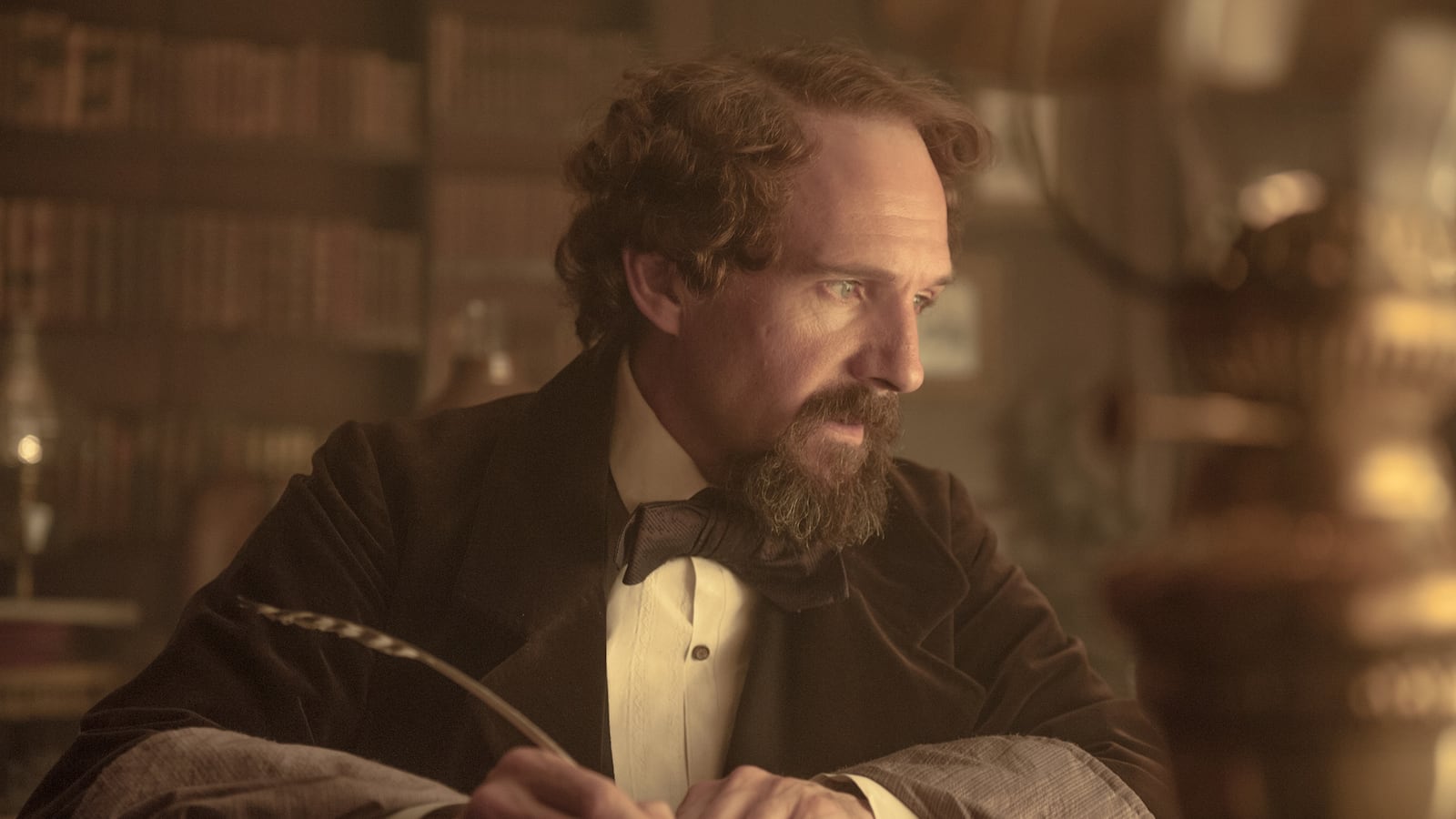
“There was a sort of frustrated sexual energy in Dickens,” Ralph Fiennes says—frustrated at least until the years covered in The Invisible Woman.
Fiennes directed and stars in the film, which explores Charles Dickens’ intense-but-secret love affair with a young actress, Ellen Ternan, known as Nelly, a liaison that endured for the last 13 years of his life. This is no stilted period piece, though. Based on Claire Tomalin’s scrupulous, enthralling 1990 book, also called The Invisible Woman, the film captures Dickens’ yearning passion, Nelly’s ambivalence, the fraught ups-and-downs of any genuine long-term love. Dickens will never seem like homework again.
The relationship between a famous, powerful married man and a much younger, publicly denied woman— Dickens was the 45-year-old father of 10 and Nelly (played by Felicity Jones), 18 when they met; at the height of the affair he wrote a letter to the Times of London denying it—resonates with today’s political sex scandals. Think of John Edwards on Nightline disavowing a child he knew was his and you get a sense of the dynamics of Dickens’ story.
Suggest that parallel to Fiennes, though, and he doesn’t so much reject it as sidestep it, offering Dickens’ point of view instead. He has so deeply, imaginatively entered Dickens’ mind that he easily veers in and out of his character’s voice, often speaking in the first person as Dickens while explaining the rage and ferocity beneath the writer’s genial, family-man popularity. Fiennes’ response is like a window into Dickens’ Victorian heart, and leads to a much more interesting conversation.
Sitting in a conference room in the offices of Sony Pictures Classics (which will release the film on Christmas Day), he looks nothing like Dickens anymore, with close-cropped hair replacing the wooly beard and thick curled wig he wears on screen. He had never paid much attention to Dickens before reading Abi Morgan’s screenplay (she also wrote The Iron Lady), and Tomalin’s work. Then, “I was completely fascinated by everything about Claire’s book,” he says.
The film is framed by some of Tomalin’s most stunning discoveries: scenes of Nelly’s life after Dickens’ death, when she buried her past and reinvented herself. She married a schoolmaster, denied that she’d been an actress, claimed Dickens as a family friend from childhood—more lies to compound the original secrecy. Yet while The Invisible Woman is her story, just as he was in life, Dickens is the dominating presence on screen. He’s a dynamo seen giving a public reading of David Copperfield, and acting in and directing a play by his best friend, Wilkie Collins (Tom Hollander), where he first meets Nelly. Acting was still a disreputable profession, but respectable Nelly is reluctant to become his kept woman.
“We have to be careful that we don’t project our modern sense” onto the 19th century, Fiennes says. The Victorians wouldn’t have thought, “ ‘Oh, she’s held in place by the man.’ She was looked after and supported,” which mattered then, “and there was this man who was going all over the country doing these readings and coming back to her.”
Long after Dickens’ death, Nelly confessed that she loathed the idea of the affair, Tomalin writes, but points out that a proper Victorian matron couldn’t have said anything else. “To say she regretted it is too extreme,” Fiennes says of Nelly. “I think she loved him but it was probably always qualified” by the sense of compromise, the isolation, the fact that they could never marry.
And here he begins to imagine their life together. “I mean, what did Dickens give her? I think he was probably very attentive and loving.” He points to scenes in the film that capture their domesticity in homes Dickens set up for Nelly and visited. “He would come back from the readings, he’d be very funny about people.... She would possibly read bits of—this is me, just a hypothetical—she would read maybe bits of manuscripts.... If he adored her as much as we think, I think there’s a chance he would have shared the proofs with her, he’d probably read the proofs to her himself, and she would listen and comment.”
But his film also reveals the other side of the adoring lover: the husband who behaved monstrously to his wife, Catherine, publicly announcing their separation before he’d bothered to tell her about it. In an era when divorce was a scandal from which reputations never recovered, Dickens—”the fiery, essential Dickens,” as Fiennes calls him—was trapped in a youthful marriage he had outgrown and a wholesome public image he treasured. A social crusader, “He would set up a home for fallen women, which was probably completely above board,” Fiennes says, “but he’s face to face with this whole other world of desire that men have. He hasn’t found a way to answer…” until Nelly.
Catherine (Joanna Scanlan) is the film’s saddest figure. Dickens really did have a carpenter build a wall between his room and hers; in the film he looks on from the other side as his wife is being walled in. His face is not cold or cruel, but determined, even pained. “When I played it,” Fiennes says, veering again into Dickens’ mind and voice, “it was like, ‘I am going to confront this. I am going to see this through. I will look you in the eye and do it.‘ “ He adds, “Poor Catherine is heavy and been pregnant all her married life.... Maybe the bit of me that wants to defend Dickens thinks that however cruelly he behaved to Catherine, he couldn’t but know in his most private moments…” and Fiennes delivers a fundamental line from the film, when Dickens quietly tells Nelly, “I know what I have done.”
Biographers long ago exposed this side of Dickens, yet it has barely budged the popular image of him as the benign creator of Tiny Tim. Along with many others, Fiennes finds the clue to Dickens’ character in “this childhood time when he felt unloved, uncared for, was in this blacking factory in London.” Unlike most, Fiennes believes that “his reaction was fury at not having a proper schooling, and the determination, the furious determination to prove himself, which resulted in this mad work ethic.” That rage, he thinks, manifested itself as “Dickens the party man,” planning games for his children, putting on shows, orchestrating his own life’s circus. “So that’s a man going,” and Fiennes speaks very fast as the manic Dickens, “ ‘I’m rewriting, I’m rewriting, I’m putting on the play, I’m doing the charity and I will not be stopped, I will not be stopped... and Catherine’s not keeping up, she’s not keeping up, after 10 years, 20, she’s not keeping up!’ And there’s Nelly—” and he makes an exploding sound.
It was mere serendipity that Fiennes was playing Magwitch in Mike Newell’s adaptation of Great Expectations (a reverent version, which came and went quickly this fall) while preparing The Invisible Woman, but he has certainly come to grips with that novel, written during Dickens’ time with Nelly, the woman whose love he could never openly claim. “Great Expectations is this book of shadows, Miss Havisham in the shadows, and Estella comes from the shadows, and Pip is flawed and snobby and an upstart.... Some of these darker figures in Dickens, where do they come from?” he asks. “They’re bits of him.”






